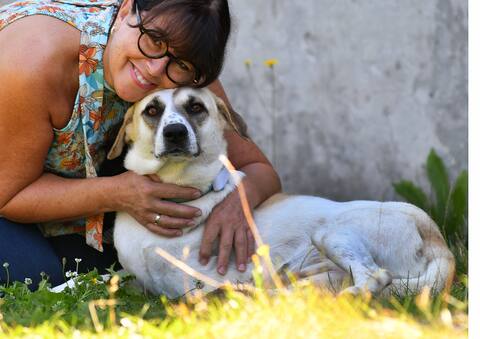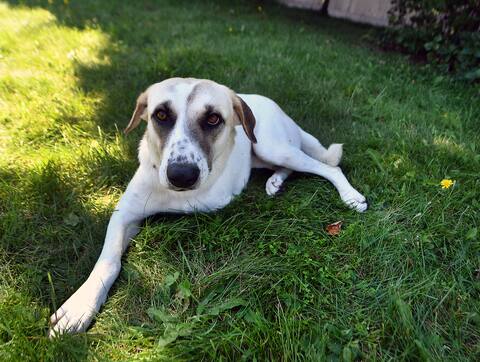A woman who has just adopted an abandoned and seriously injured dog in Lebanon denounces a decision by the Canadian government, which will soon ban the arrival of “commercial dogs” from a hundred countries, condemning these beasts “to a cruel fate “.
As of September 28, “the entry into Canada of commercial dogs from countries at high risk for canine rabies will be prohibited until further notice,” the Canadian Food Inspection Agency (CFIA) said. .
This CFIA decision communicated on June 28 includes animals intended for adoption and aims to “reduce the risk of introduction of canine rabies (rabies caused by viruses of the canine variant) into Canada. »
This new regulation, however, condemns thousands of animals to know “a cruel fate”, denounces Dominique Andrieux, a citizen of Saint-Lambert-de-Lauzon.
” A joke “
Photo QMI Agency, René Baillargeon
The lady welcomed Jedi into her home three weeks ago, an Anatolian shepherd “about three years old.” The adorable beast arrived from a shelter in Lebanon after being martyred and beaten for no reason. A large number of dogs from Lebanon, Tunisia and Morocco in particular are adopted in Quebec each year.
“It’s really a farce, this law,” says Ms. Andrieux, recalling that Canada is a “leader who has welcomed thousands and thousands of dogs” for a long time. “They are doomed to a cruel fate. It is condemning them to death”.
Photo QMI Agency, René Baillargeon
The new regulations have been decried by several animal welfare organizations and shelters. In Quebec, Pitou sans frontières, an animal shelter that rescues dogs from other countries, including Tunisia, wants the CFIA to back down.
“It’s a decision that is very excessive and it will really complicate our task of saving animals,” says Sylviane Faucher, co-founder of the organization.
From now on, “dogs will no longer be able to arrive commercially, as the government calls it, but in a personal way. People are going to have to adopt without seeing the dog. […] It really complicates having good matches [entre les familles adoptives] and dogs,” adds Ms. Faucher.
imitate the United States
Just as Ms. Andrieux suggests, Ms. Faucher believes that Canada should take inspiration from its neighbors to the south, where such a decision was made last summer before being relegated to oblivion. The two women propose that a blood test and stricter rules be imposed as the Americans have done.
This idea is echoed by Razane Khatib, president of the Alyarz Pet Club, a Lebanese organization dedicated to animal rescue and which sends several dogs to other countries every month.
“We are ready to accept stricter rules [du Canada], even if it will cost us more and be more complicated. It’s unfair for the dogs,” said Ms. Khatib, who was contacted in Lebanon moments after participating in the sending of nine dogs abroad.
“Canada is a country that opens its hands to help. It’s easy to work with Canadians. We are ready to do more to continue to be able to give animals a loving family here,” she said, hoping to see the government backtrack.
To “protect” our animals
On the side of the Order of Veterinary Physicians of Quebec, we consider that the imposition of this regulation remains necessary to “protect our Canadian animals”.
“Yes, to wish good for certain animals, we are in complete agreement. Animal health and welfare must come first. What they have to go through in other countries sometimes is unacceptable. But with regard to the whole aspect of health and safety at the Canadian level, you have to be very careful because it could have major repercussions. »

